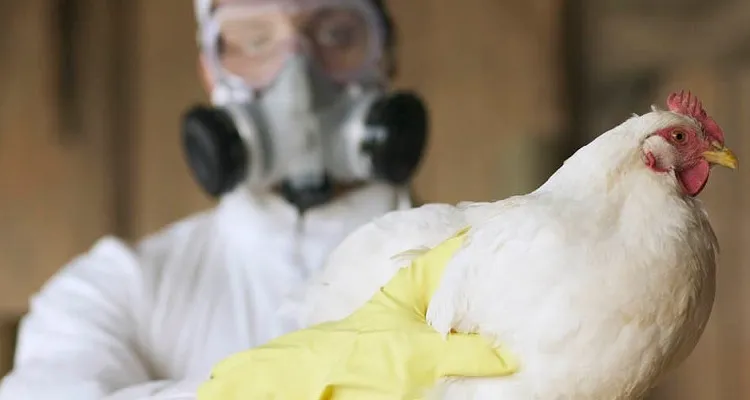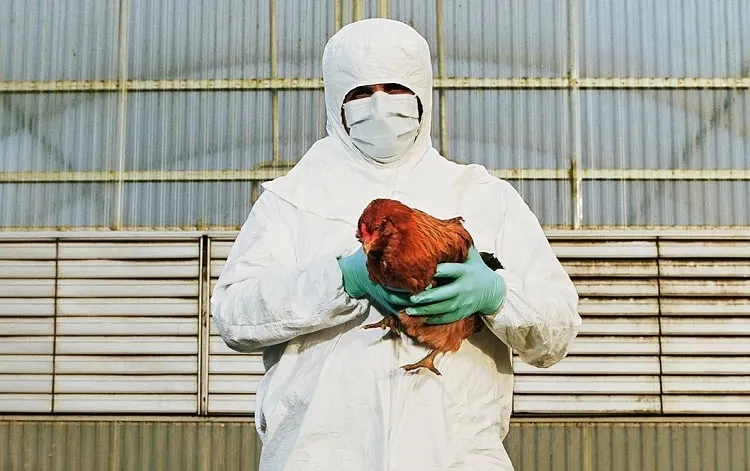Is bird flu highly contagious? What are its symptoms? How do humans catch bird flu? And, how to stay protected? Bird flu, scientifically known as avian influenza, is a contagious and potentially deadly virus that affects birds. It can spread rapidly through a flock or even between wild bird populations. In rare cases, it can also be passed to humans. But how exactly does that happen? Keep on reading to find out all you need to know about the virus and how to stay safe from contaminating it.
How do humans catch bird flu?

There are a number of different ways that humans can catch bird flu. The most common is through direct contact with an infected bird or its droppings, such as when a bird handler or farmer works closely with birds. A person can get infected with bird flu if the virus gets into their eye, nose, or mouth. Hence, you should be careful with touching your face. Another potential cause of human infection includes ingesting food contaminated with bird flu, such as raw poultry. To that, add coming into contact with water contaminated with bird flu, such as from a pond where infected birds have bathed. And one of the most common causes of bird flu is coming into contact with surfaces or objects that have been contaminated with bird flu, such as cages or utensils used to handle infected birds.
Can bird flu spread to humans through the air?
Not exactly. A person can get contaminated with bird flu in rare cases where particles of the virus are inhaled. This can happen if droplets or dust from the virus have spread in the air, and you breathe them in. Otherwise, bird flu can’t spread to humans through the air.
What are the symptoms of bird flu in humans?

Contamination of bird flu in humans can go from experiencing no symptoms whatsoever to mild illness and severe cases such as hospitalized pneumonia. Reported symptoms include eye redness (conjunctivitis), fever, cough, sore throat, difficulty breathing, muscle aches, runny nose, fatigue, and headaches. Symptoms of diarrhoea or vomiting are less common in bird flu contamination in humans. In the severe cases, it can also lead to acute respiratory distress syndrome, organ failure, and even death. If you experience any signs or symptoms of bird flu, you should seek medical attention as soon as possible. Early detection and treatment of bird flu can reduce the risk of serious illness or death.
How to confirm that you have the bird flu?
Accepting you have caught the disease on the preference that you are experiencing some of the aforementioned symptoms is not enough. To establish that you have avian influenza, laboratory testing is required. A swab needs to be taken from the upper respiratory tract (either the nose or throat) of the one who is sick. Best to take a lab test on the first few days of the sickness for accurate results. However, if you have already passed the disease, it will be difficult to confirm that you were sick from testing a specimen.
Can avian influenza spread human-to-human?
It is important to remember that human-to-human transmission of bird flu is very rare. However, it is still possible for an infected person to spread the disease to other people through close contact. Hence, you should take extra precautions if you are in close contact with someone who has the virus. Read below on how to stay protected from bird flu.
How to stay protected from the virus?

Avoid contact
The best way to protect against bird flu is to avoid contact with sick or dead birds and to practice good hygiene. This means washing your hands frequently and thoroughly with soap and water after touching animal products or coming into contact with wild birds. Most often, cases of avian influenza in humans are caused by close, continuous and unprotected (not wearing protection clothing) contact with sick birds, after which the person touches their mouth, nose or eyes. That is why it is crucial to wear protective clothing such as gloves, goggles, and masks when handling live poultry. It is also important to cook poultry thoroughly to kill any potential viruses.
Be informed
It is also helpful for you to keep up-to-date on the latest news about bird flu. Many countries have adopted measures to prevent the spread of bird flu, including vaccinations, surveillance, and control of animal movement. The World Health Organization (WHO) regularly provides updates on the status of bird flu outbreaks around the world. Always make sure you are well-informed about any potential treats of bird flue outbreaks.
At the end of the day, the best way to reduce the risk of catching bird flu is to practice good hygiene and exercise caution around potentially contaminated birds and their droppings. Although it is rare, people should be aware of the potential risks associated with bird flu and take the necessary precautions to protect themselves and others. Good luck and stay safe!
